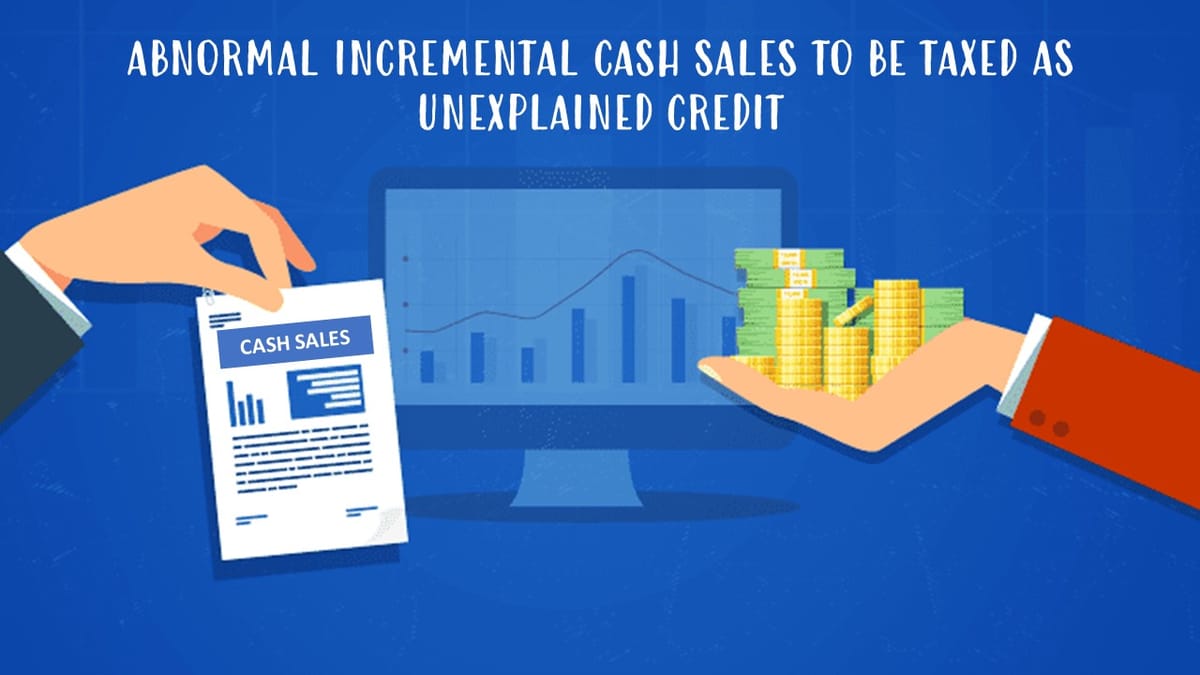Abnormal incremental cash sales during demonetization period to be taxed as unexplained credit: ITAT
CA Pratibha Goyal | Jun 14, 2023 |

Abnormal incremental cash sales during demonetization period to be taxed as unexplained credit: ITAT
In matter of Shankarlal Thakordas Narsingani vs CIT-I the Income Tax Appellant Tribunal (ITAT) held that when majority of sales made by the assessee was in cash, it was only vis-à-vis abnormal incremental sales made during the demonetization period that would be taxed as unexplained credit under section 68 of the Income Tax Act.
Relevant Text:
10. It is evident from the above that the assessee had clearly demonstrated that the entire cash deposited during demonetization could not be treated as unexplained; that its scale of business operations was huge and nature of business was such that 90% of its sales was done in cash, and even prior to demonetization, the assessee had made huge cash sales commensurate to the sale made during the demonetization period. All these explanation given by the assessee was rightly taken note of by the AO and finding anomaly to the extent of substantial increase in sales during the demonetization period, he considered it fit to treat 20% of the sales as unexplained credits. The ld.Pr.CIT’s view that entire cash deposits during this period is to be treated as unexplained, is contrary to the facts on record, wherein the assessee has demonstrated the factum of huge turnover prior to and post demonetization in the preceding year, and even in the succeeding year, and also factum of majority of the sales being in cash. Therefore, there was no occasion at all for the AO to treat the entire cash deposited during the demonetization period, as unexplained credits. The facts on record could not have led to the inference that entire sales made by the assessee during the demonetization period were bogus. In fact, the inference drawn by the AO, that only a portion of it could be treated as bogus/unexplained, was not incorrect. Therefore, we hold that the ld.Pr.CIT’s finding of error is based on incorrect appreciation of the facts before it, and his finding that the assessee had not been able to substantiate its explanation for cash sales completely is also not correct. In fact, as rightly found by the AO, to a great extent his explanation was substantiated that the majority of sales made by the assessee was in cash, but it was only vis-à-vis abnormal incremental sales made during the demonetization period, the AO refused to agree with the assessee.
Also the finding of the ld.Pr.CIT therefore that the AO completely disagreed with the assessee regarding its explanation and found the explanation of the assessee to be unsatisfactory for the entire cash deposits, is also incorrect. As noted above, the AO was dissatisfied not with the explanation of the entire cash deposits, but only partially in view of the abnormal increase in the sales shown by the assessee during that period.
11. In view of the above, the finding of the ld.Pr.CIT that the entire cash deposits during the demonetization ought to have been treated as unexplained credit under section 68 of the Act, we hold, could not have been inferred from the facts on record, and there is no error as such in the order of the AO in this regard. The order passed by the ld.Pr.CIT under section 263 of the Act holding the assessment order erroneous so as to cause prejudice to the Revenue is therefore not sustainable in law and is set aside. The grounds raised by the assessee are allowed in above terms.
For Official Judgment Download PDF Given Below:
In case of any Doubt regarding Membership you can mail us at contact@studycafe.in
Join Studycafe's WhatsApp Group or Telegram Channel for Latest Updates on Government Job, Sarkari Naukri, Private Jobs, Income Tax, GST, Companies Act, Judgements and CA, CS, ICWA, and MUCH MORE!"